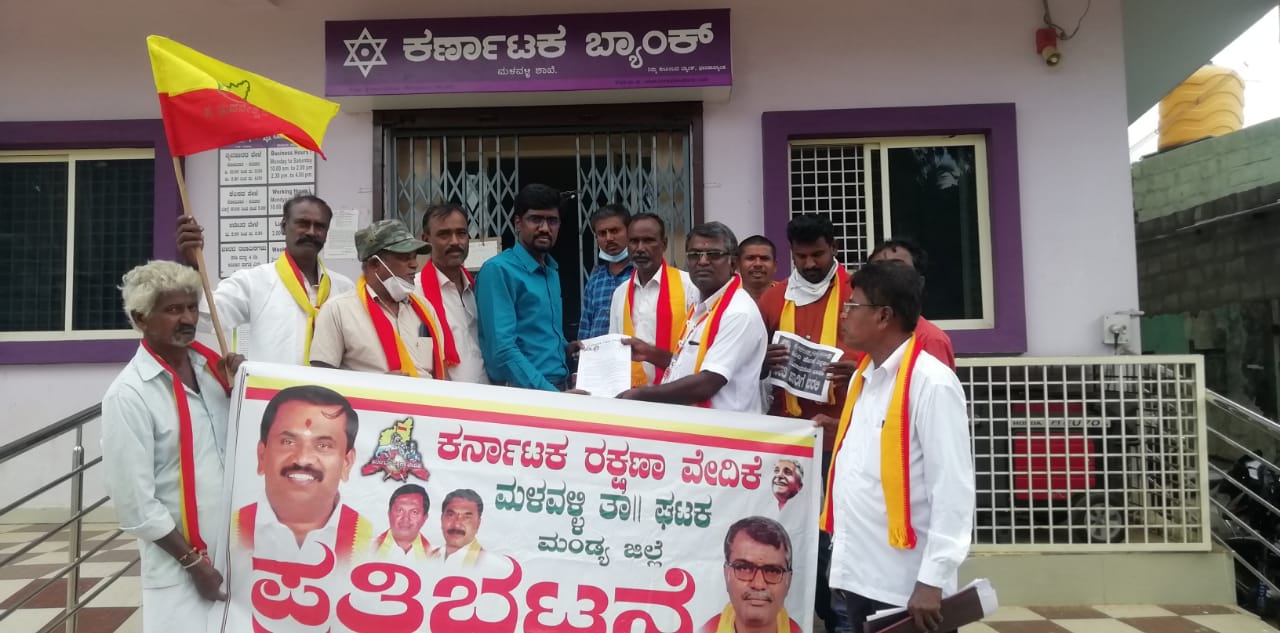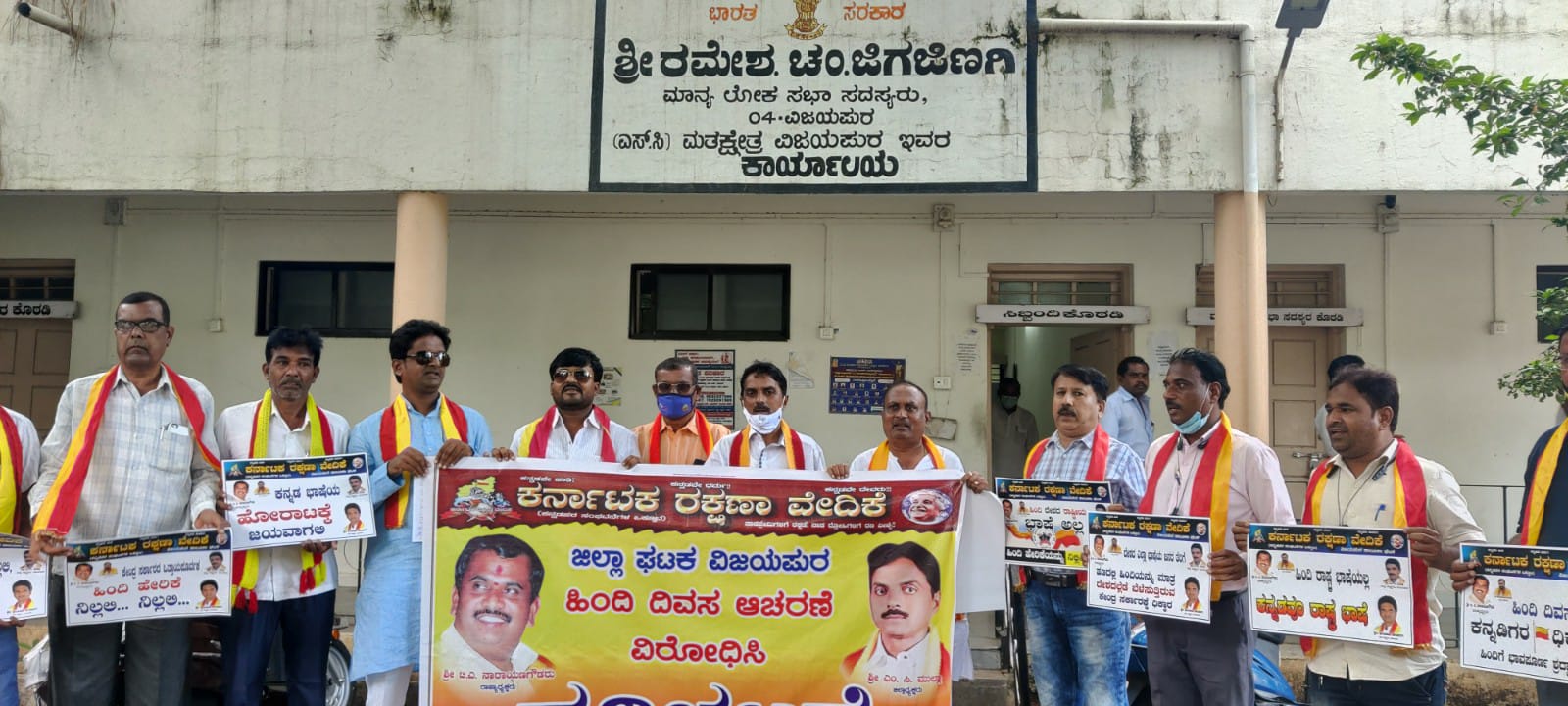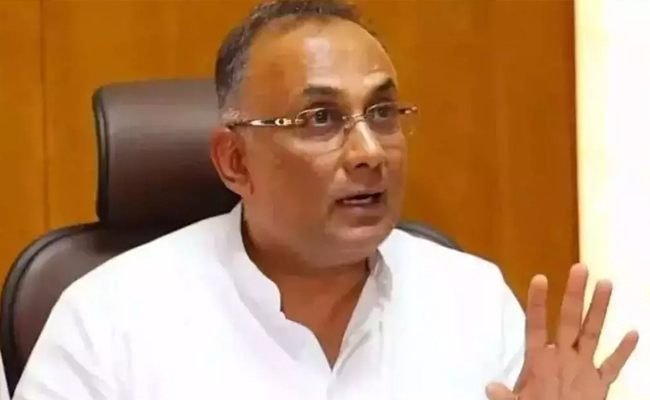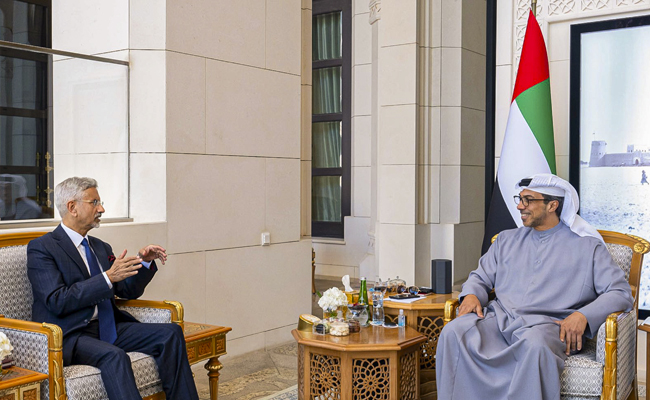Bengaluru, Sep 14: In protest against the "imposition of Hindi", Kannada organisations on Tuesday held a twitter campaign and picketing in front of banks in several parts of Karnataka, on the occasion of Hindi Diwas.
The Karnataka Rakshana Vedike (KRV) has organised a Twitter campaign with hashtag "#StopHindiImposition" from 10 am to 10 pm on Tuesday, while its activists staged picketing in front of banks in different parts of the State.
KRV has tweeted pictures of its activists staging picketing in Sedam, Chincholi, Ron, Hungund, Hiriyur, Pandavapura, Bengaluru, Vijayapura, Kalaburagi, Chikkaballapura, Thirthahalli, Udupi, Uttara Kannada, Kolar, Mandya and Dharwad, among several other places.
They submitted a petition to managers of the banks urging them to stop alleged Hindi imposition and to provide services in Kannada.
According to Arun Javgal, state organisation secretary of Karnataka Rakshana Vedike (KRV), the intention behind conducting protests in front of nationalised banks is also to raise awareness among the masses and thereby tell the people of Karnataka about the way, "Hindi Imposition" has snatched thousands of jobs from Kannadigas in Banks operating in the state.
"Using the Taxpayers money from across the country and yet, giving undue importance only to Hindi in a multilingual country like India is something KRV opposes vehemently," he said in a tweet.
KRV state President Narayanagowdru T A termed Hindi Diwas celebrations as "anti-democratic and immoral".
"It (Hindi Diwas) is against the intent of the constitution which says all citizens are equal ," he said, as he called on all non-Hindi speaking communities and those Hindi speakers, who believe in equality, to oppose it.
Coming in support of voices against Hindi Diwas celebration, JD(S) leader and former Chief Minister H D Kumaraswamy in a tweet said "Kannada is first in Karnataka. Hindi Diwas celebration is unnecessary. Let's not disturb the peace in multilingual India by imposing Hindi." Several other organisations like Karnataka Janaadhikaara Paksha observed it as 'Black Day'.
ಹಿಂದಿ ಹೇರಿಕೆಯನ್ನು ಕನ್ನಡಿಗರು ಒಪ್ಪುವುದಿಲ್ಲ. ಹಿಂದಿ ದಿವಸ ಆಚರಣೆಯನ್ನೂ ಸಹಿಸುವುದಿಲ್ಲ. ಒಕ್ಕೂಟದ ಎಲ್ಲಾ ಭಾಷೆಗಳಂತೆ ಹಿಂದಿಯೂ ಒಂದು ಭಾಷೆಯಷ್ಟೇ. ಕೇಂದ್ರ ಸರಕಾರ ಹಿಂದಿಗೆ ʼಇಂದ್ರ ವೈಭೋಗʼ ನೀಡಿ ಅನ್ಯ ಭಾಷೆಗಳನ್ನು ಬೀದಿಪಾಲು ಮಾಡುವುದನ್ನು ಸಹಿಸಲಾಗದು.(2/4)
— H D Kumaraswamy (@hd_kumaraswamy) September 13, 2021
ಹಿಂದಿ ಹೇರುವವರಿಗೆ ತಿಳಿದಿರಲಿ. ನಮ್ಮ ಕನ್ನಡ ಅಭಿಜಾತ ಭಾಷೆ. ನಮ್ಮ ಕನ್ನಡ ಸಾವಿರಾರು ವರ್ಷಗಳ ಘನ ಚರಿತ್ರೆಯುಳ್ಳ ಭಾಷೆ. ನಮ್ಮ ಕನ್ನಡ 6.4 ಕೋಟಿ ಜನರ ಹೃದಯಮಿಡಿತ. ನಮ್ಮ ಪಾಲಿನ ಮಾತೃಸ್ವರೂಪಿಣಿ. (3/4)
— H D Kumaraswamy (@hd_kumaraswamy) September 13, 2021
ನಮ್ಮ ನೆಲದಲ್ಲಿ ನಮ್ಮ ಕನ್ನಡ ಭಾಷೆಯೇ ಮೊದಲು. ಹಿಂದಿ ದಿವಸ ಆಚರಣೆ ಅಸಮರ್ಪಕ ಮತ್ತು ಅನಗತ್ಯ. ಹಿಂದಿ ಹೇರಿಕೆಯಿಂದ ಬಹುಭಾಷೆಯ ಭಾರತದ ನೆಮ್ಮದಿ ಕದಡುವುದು ಬೇಡ. (4/4)
— H D Kumaraswamy (@hd_kumaraswamy) September 13, 2021


Let the Truth be known. If you read VB and like VB, please be a VB Supporter and Help us deliver the Truth to one and all.
New Delhi: A bill to set up a 13-member body to regulate institutions of higher education was introduced in the Lok Sabha on Monday.
Union Education Minister Dharmendra Pradhan introduced the Viksit Bharat Shiksha Adhishthan Bill, which seeks to establish an overarching higher education commission along with three councils for regulation, accreditation, and ensuring academic standards for universities and higher education institutions in India.
Meanwhile, the move drew strong opposition, with members warning that it could weaken institutional autonomy and result in excessive centralisation of higher education in India.
The Viksit Bharat Shiksha Adhishthan Bill, 2025, earlier known as the Higher Education Council of India (HECI) Bill, has been introduced in line with the National Education Policy (NEP) 2020.
The proposed legislation seeks to merge three existing regulatory bodies, the University Grants Commission (UGC), the All India Council for Technical Education (AICTE), and the National Council for Teacher Education (NCTE), into a single unified body called the Viksit Bharat Shiksha Adhishthan.
At present, the UGC regulates non-technical higher education institutions, the AICTE oversees technical education, and the NCTE governs teacher education in India.
Under the proposed framework, the new commission will function through three separate councils responsible for regulation, accreditation, and the maintenance of academic standards across universities and higher education institutions in the country.
According to the Bill, the present challenges faced by higher educational institutions due to the multiplicity of regulators having non-harmonised regulatory approval protocols will be done away with.
The higher education commission, which will be headed by a chairperson appointed by the President of India, will cover all central universities and colleges under it, institutes of national importance functioning under the administrative purview of the Ministry of Education, including IITs, NITs, IISc, IISERs, IIMs, and IIITs.
At present, IITs and IIMs are not regulated by the University Grants Commission (UGC).
Government to refer bill to JPC; Oppn slams it
The government has expressed its willingness to refer it to a joint committee after several members of the Lok Sabha expressed strong opposition to the Bill, stating that they were not given time to study its provisions.
Responding to the opposition, Parliamentary Affairs Minister Kiren Rijiju said the government intends to refer the Bill to a Joint Parliamentary Committee (JPC) for detailed examination.
Congress Lok Sabha MP Manish Tewari warned that the Bill could result in “excessive centralisation” of higher education. He argued that the proposed law violates the constitutional division of legislative powers between the Union and the states.
According to him, the Bill goes beyond setting academic standards and intrudes into areas such as administration, affiliation, and the establishment and closure of university campuses. These matters, he said, fall under Entry 25 of the Concurrent List and Entry 32 of the State List, which cover the incorporation and regulation of state universities.
Tewari further stated that the Bill suffers from “excessive delegation of legislative power” to the proposed commission. He pointed out that crucial aspects such as accreditation frameworks, degree-granting powers, penalties, institutional autonomy, and even the supersession of institutions are left to be decided through rules, regulations, and executive directions. He argued that this amounts to a violation of established constitutional principles governing delegated legislation.
Under the Bill, the regulatory council will have the power to impose heavy penalties on higher education institutions for violating provisions of the Act or related rules. Penalties range from ₹10 lakh to ₹75 lakh for repeated violations, while establishing an institution without approval from the commission or the state government could attract a fine of up to ₹2 crore.
Concerns were also raised by members from southern states over the Hindi nomenclature of the Bill. N.K. Premachandran, an MP from the Revolutionary Socialist Party representing Kollam in Kerala, said even the name of the Bill was difficult to pronounce.
He pointed out that under Article 348 of the Constitution, the text of any Bill introduced in Parliament must be in English unless Parliament decides otherwise.
DMK MP T.M. Selvaganapathy also criticised the government for naming laws and schemes only in Hindi. He said the Constitution clearly mandates that the nomenclature of a Bill should be in English so that citizens across the country can understand its intent.
Congress MP S. Jothimani from Tamil Nadu’s Karur constituency described the Bill as another attempt to impose Hindi and termed it “an attack on federalism.”



_vb_22.jpeg)

